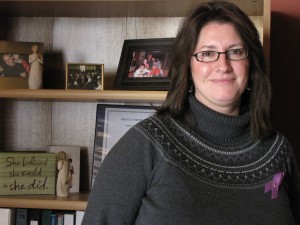
Whether a CEO or a homemaker, domestic violence knows no boundaries.
Grace Smith House has been working in the Dutchess County community for 30 years, its housing and advocacy locations kept under wraps to protect the women and children seeking refuge from the cycle of violence.
“Many don”™t succeed, unfortunately,” said Renee Fillette, executive director. “The most dangerous time to leave is when you are about to get out, abusers sense it and step up the pace. We have had six domestic-violence related homicides in the city of Poughkeepsie this year. A wealthy lawyer in Westchester killed his wife and children in October. It”™s not just a problem in homes with financial stress ”“ it can happen anytime, anywhere, to anyone. What goes on behind closed doors is often unknown to even close family members ”“ and usually comes out when it makes the newspaper.”
Fillette had volunteered and interned at Grace Smith House while a student at SUNY New Paltz. When 2-year-old Daniel Funk was killed by his mother, “I felt I had to do something,” Fillette said. She began in earnest advocating for hard-to-place children in the foster care system, often shell-shocked from their daily living conditions. St. John Bosco Child and Family Services, which Fillette founded, is still very active, thanks to her commitment.
When Judy Lombardi became a new mom, Grace Smith House selected Fillette to replace her as its new executive director in June 2010. “Judy is a great mentor,” said Fillette of Lombardi, who stayed on to work in outreach and advocacy.
Grace Smith House has its apartment complex in the city and another location in the eastern part of the county where women can stay from 30 to 90 days. A 24-hour crisis hotline, liaisons that work with parents in Family Court, Child Protective Services, ongoing classes and a 24-hour crisis hotline make up many of the support services Grace Smith House has provided to thousands.
Unfortunately, said Fillette, many women choose to stay or to return to their abusive relationships.
“There are many reasons … they still love the abuser and believe if they try harder, the abuser will change. If they haven”™t worked and the abuser is the main source of income that is another reason. We hear about the worst cases in the papers ”“ like the man who shot his wife and the police officer in the Poughkeepsie train station in front of his child … but domestic violence is everywhere. You can be isolated from your friends, cut off from finances, told where to go and what to do ”“ it is not always physical violence that constitutes domestic violence ”“ children seem to be the prime motivator for women to get out. They don”™t want them to see mommy being abused or for them to grow up and become abusers themselves.”
Has the recession made life more difficult for the nonprofit and the women and children it helps?
“It”™s made it more difficult for all nonprofits, but funding is a concern for everyone, whether the private or public sector. We are constantly working to streamline human resources and administrative costs to avoid what is commonly called the ”˜starvation cycle.”™ There are some positions you cannot do without. We have a finance director to keep us on track, which many people see as unnecessary. It”™s difficult to explain this to someone outside the business world. Nonprofits must be just as on top of their spending as for-profits are.”
They are also working to keep programs working at the same level as they were before the recession began, doing more with less and getting creative to make it happen. “What it has made especially difficult for us is the lack of jobs for the women in our program,” Fillette said. “Many women have gaps in employment or need training. Thank God for United Way ”“ they have been a tremendous resource for our families, helping women get registered in college, obtain a driver”™s license or to get a certified nursing assistant license. United Way has been invaluable in helping us to get people back on their feet.”
The women”™s program has been in existence for 30 years, founded by a member of the famed Smith Brothers”™ cough drops family, Grace Smith, who began her volunteer work with battered women and children as a member of the First Presbyterian Church of Poughkeepsie. Its first “safe house” was named in her honor and is the largest women”™s shelter and support system between New York City and Albany.
Thirty active volunteers ”“ and many interns from Adelphi, Vassar, Bard, Marist and Dutchess Community College ”“ help keep the wheels turning, Fillette said. “Our volunteers and interns are dedicated and stick with it. They are our biggest resource.”
Fillette says an occasional story filters back about time spent living at Grace Smith House apartments. “One man told us that he was here as a child, and it was the best Christmas he ever had … it”™s good to hear. Everyone needs to feel that ”˜home”™ is a safe place to be.”

















